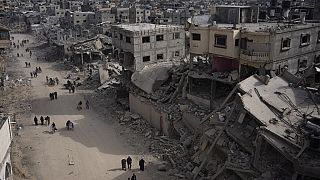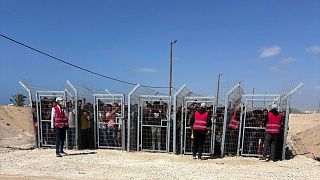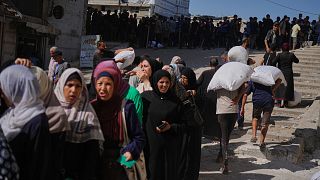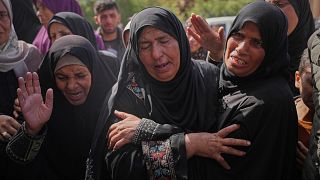Gaza
When Israel declared war on Gaza in October, it stood unified at home and enjoyed broad backing from around the world following an unprecedented attack by the militant group.
Six months later, Israel finds itself in a far different place: bogged down in Gaza, divided domestically, isolated internationally and increasingly at odds with its closest ally. The risk of a broader regional war remains real, AP Mideast correspondent Joe Federman explains.
The offensive has pushed Gaza into a humanitarian crisis, displacing more than 80% of the population and leaving over 1 million people on the brink of starvation.
Israel declared war in response to Hamas’ Oct. 7 attack, in which the militant group killed 1,200 people, most of them civilians, and kidnapped about 250 others.
Prime Minister Benjamin Netanyahu set two objectives: destroying Hamas and bringing home the hostages. Despite his repeated pledges to achieve “total victory,” his goals remain elusive.
Netanyahu has repeatedly vowed to invade the southern city of Rafah, but he faces broad international opposition, including from the United States, because of the hundreds of thousands of displaced Palestinians sheltering there.
Even if Israel does invade Rafah, there is no guarantee of long-term success.
Although Hamas appears to have suffered heavy losses, its forces have managed to regroup in areas abandoned by Israel.
Israel enjoyed broad international support following the massacre, which was the deadliest attack against Jews since the Holocaust.
However, that goodwill has been replaced by impatience and outrage as conditions in Gaza worsen.
More than 33,000 Palestinians have been killed in the war, around two-thirds of them women and children, according to Palestinian health officials whose death toll doesn’t distinguish between civilians and fighters.
International aid officials say roughly one-third of Gaza’s population is dealing with catastrophic hunger.
Initial expressions of solidarity from Israel’s allies have given way to calls for a halt to the fighting.
Meanwhile, the U.N. world court, looking into genocide allegations against Israel, has ordered Israel to do more to protect Gaza’s civilians.
Things have only worsened following Israel's killing of seven aid workers in what it says was an errant airstrike.
Six of the victims were volunteers from countries allied with Israel, antagonizing them and outraging U.S. President Joe Biden.
After a period of broad unity early in the war, Israel has returned to its divided self — with its polarizing leader at the center of the storm.
Weekly protests against the government have grown and attract thousands.
The plight of the hostages and the anguished cries of their families have resonated deeply with the Israeli public.
Some hostage families were among the tens of thousands of people who took to the streets this week calling on the government to resign.
Netanyahu’s popularity has plummeted since the outbreak of the war, with many holding him responsible for the intelligence and security failures that allowed the Oct. 7 attack to occur.
But he faces no immediate threat to his rule.
There is no consensus for the future of Gaza.
Israel hasn’t presented a postwar vision acceptable to its partners, and cease-fire talks remain at a standstill.
Netanyahu has presented a vague vision that calls for open-ended Israeli control of the territory, with local Palestinian partners in Gaza administering day-to-day affairs.
These plans, though, clash with visions promoted by the U.S., other international partners and the Palestinians.
The U.S. has called for a return of the internationally recognized Palestinian Authority, which Hamas ousted from Gaza in 2007, and for renewed efforts to establish an independent Palestinian state in the West Bank and Gaza.
Netanyahu opposes Palestinian statehood or any role for the PA.
Meanwhile, there is little appetite among donor nations to contribute to reconstruction without a political consensus.











Go to video
Gaza’s scarcity of cash fuels desperation, sparks unusual trade
Go to video
Trump garners Nobel Peace prize nominations amid mixed global reactions
01:09
Israel bombs Houthi targets in Yemen, rebels respond with missile attack
01:00
Hamas gives 'positive' response to 60-day ceasefire proposal but says talks needed on implementation
01:00
Pix of the Day: July 2, 2025
01:04
Israeli airstrike on popular Gaza City beach café kills at least 30